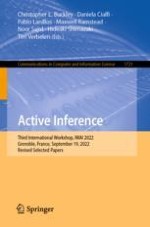2023 | OriginalPaper | Buchkapitel
Value Cores for Inner and Outer Alignment: Simulating Personality Formation via Iterated Policy Selection and Preference Learning with Self-World Modeling Active Inference Agents
verfasst von : Adam Safron, Zahra Sheikhbahaee, Nick Hay, Jeff Orchard, Jesse Hoey
Erschienen in: Active Inference
Verlag: Springer Nature Switzerland
Aktivieren Sie unsere intelligente Suche, um passende Fachinhalte oder Patente zu finden.
Wählen Sie Textabschnitte aus um mit Künstlicher Intelligenz passenden Patente zu finden. powered by
Markieren Sie Textabschnitte, um KI-gestützt weitere passende Inhalte zu finden. powered by
